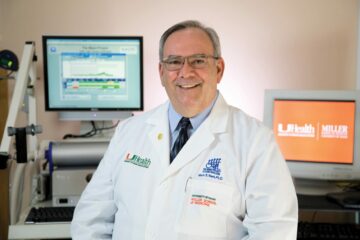(September 2021) Mark S. Nash, Ph.D., FACSM (Neurological Surgery, Physical Medicine & Rehabilitation, Physical Therapy, and The Miami Project to Cure Paralysis) has been named to the Executive Board of the American Spinal Injury Association (ASIA). ASIA represents the premier Americas organization in the field of Spinal Cord Injury care, education, and research. Dr. Nash, a current member of the ASIA Board of Directors, will proceed through the organization leadership track to become ASIA President in 2025.
As part of The Miami Project, Dr. Nash’s research centers on the physiological assessment of secondary complications following SCI: cardiometabolic and vascular physiology, cardiovascular pathology, exercise and nutritional biochemistry, electrical stimulation and bionics for movement and health.
One of the enduring goals of The Miami Project has been to test and implement treatment strategies that optimize the long-term health of persons with SCI. One of the strategies employed by Dr. Nash and his team to attain this goal is to investigate physical activity as a means of preventing medical complications that arise from physical deconditioning. In past years these studies have examined how electrically-stimulated cycling and ambulation exercise affect fitness levels in persons with tetraplegia and paraplegia. The findings of these studies support the belief that physical activity can improve fitness, heart function, and peripheral circulation, and that exercise training programs benefit the structure and function of muscle. Both direct and indirect evidence obtained from their studies over the years suggests that exercise lowers physical and emotional stress by reducing the release of stress hormones from the adrenal glands, or altering the way in which target tissues respond to stress challenges.
There is widespread concern that the population of persons who survive SCI is aging, and that the passing of time presents an entirely new set of physical and health challenges for those who were injured years ago. Dr. Nash and his team have anticipated these changes and targeted some of their research to address the effects of exercise on the functions of the heart and circulation for those who are older than 40 years. This research has also examined the naturally-occurring decline in shoulder joint function that accompanies aging with SCI as well as the disposition to heart and circulatory diseases. Results of these trials have been very encouraging and confirm that exercise interventions are successful in reversing longstanding deconditioning and muscle weakness. Research subjects involved in these trials have also benefited by improved cardiac function at rest and during activity, and through blood lipid changes that slow the natural course of heart disease. As in Dr. Nash’s previously published findings, this work holds great promise for improving health and function while reducing disease susceptibility for those who live with SCI.

